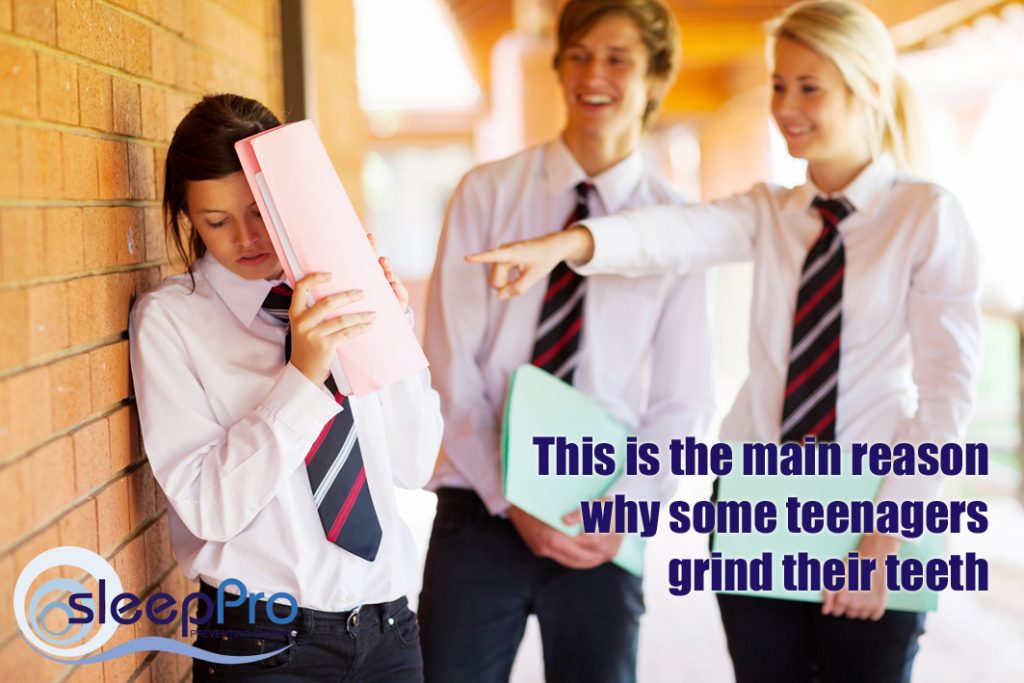
If you’re a parent with children at school you need to read this.
Share
At some stage or other in life it is estimated that as many as 50% of us suffer from grinding our teeth, mostly at night, but this is not merely an affliction that occurs in adults. New research reported by the BBC has emphasized this in the last week and highlighted that grinding teeth often starts very young due to severe stress and anxiety.

However a major reason for it starting is now known to be bullying at school. It can lead to children and teenagers having headaches, worn-down teeth and disrupted sleep, and it appears to be rising significantly.
A study published in the Journal of Oral Rehabilitation found that 13 to 15-year-olds who experienced verbal bullying at school were nearly four times as likely to suffer from teeth-grinding at night, or sleep bruxism, than other teenagers. That equated to 65% among the bullied students, compared to 17% among the others.
An oral health charity said parents and schools should be aware of the problem, which can also affect adults who are stressed and anxious.
With the increasing role of social media in this area children are now prone to verbal bullying on a wider basis and for 24 hours a day.
The grinding of our teeth, often called Bruxism, mostly occurs during sleep but it also happens sometimes during the day. In addition to being detrimental to our oral and dental health, the noise from bruxism can often be disturbing for others. It can lead to headaches, jaw pain and daytime tiredness and if left untreated, dental damage will usually occur, leading to tooth loss and gum disease.
Dr Nigel Carter, from the Oral Health Foundation, said bruxism was also something to look out for everywhere and not just in the UK.
“Grinding teeth may not sound like a priority within the wider picture, but it could prove to give a vital insight into a child’s state of mind and could be an important sign for us to identify bullying at an earlier stage.”
He said sleep bruxism could be particularly damaging – but people were often unaware they were doing it and it often went unnoticed and untreated until it had developed into a major problem.
In most cases, grinders end up with flat areas on their teeth and frayed edges as the teeth start to become very thin, and a tell-tale sign is a constant headache or sore jaw when waking up.
There are no medications that will stop sleep bruxism and all dentists will suggest you use a mouth guard.
The good news is that there are several potential treatments. You can acquire a simple dental appliance called a splint, made of a special type of hard plastic, which fits to the shape of your teeth and stops them grinding together. When this basic inexpensive splint is placed briefly into hot water it allows it to be shaped as you bite into it. The aim is to try and make the teeth sit comfortably together. When using the appliance, chewing is smooth and the teeth are protected.
More advanced versions can be made that fit much more comfortably and do an improved job for you. These night guards are custom-made to fit your dental profile and are terrific value. They generally are made to fit the upper set of teeth only but can be requested for the lower set if this is preferred.
Teeth grinding can also be caused by sleep disorders such as sleep apnoea and heavy snoring so it may not be happening in isolation, and care should be taken to check in what form it exists. You may find that a special style of mouthpiece that helps to prevent OSA or heavy snoring may also help you to eliminate the problem of grinding your teeth.
These are called mandibular advancement devices, or MAD’s, and are most commonly used when a sleep disorder like sleep apnoea is the most likely cause. They’re also bespoke and made specifically to fit your jaw and are usually worn over both the top and the bottom teeth. The purpose of this is to bring your bottom jaw forward and this keeps the airway open, preventing snoring and episodes of sleep apnoea, as well as stopping you grinding your teeth.
The choice is yours, as is the choice of price point, but all of the above options are great value when you consider what they will prevent happening.
John Redfern

